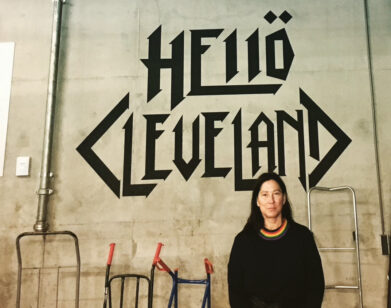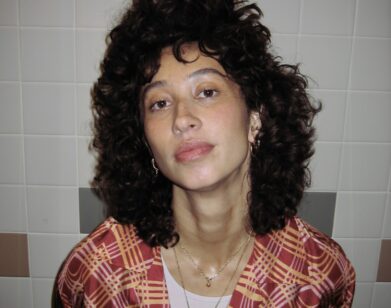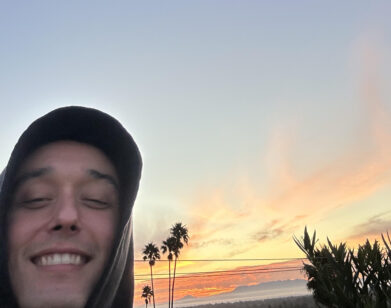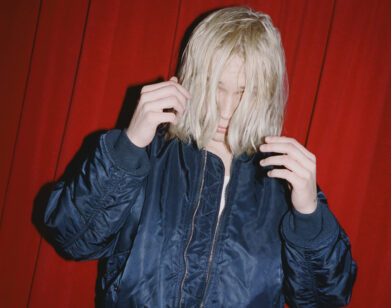New Again: Bernie Taupin
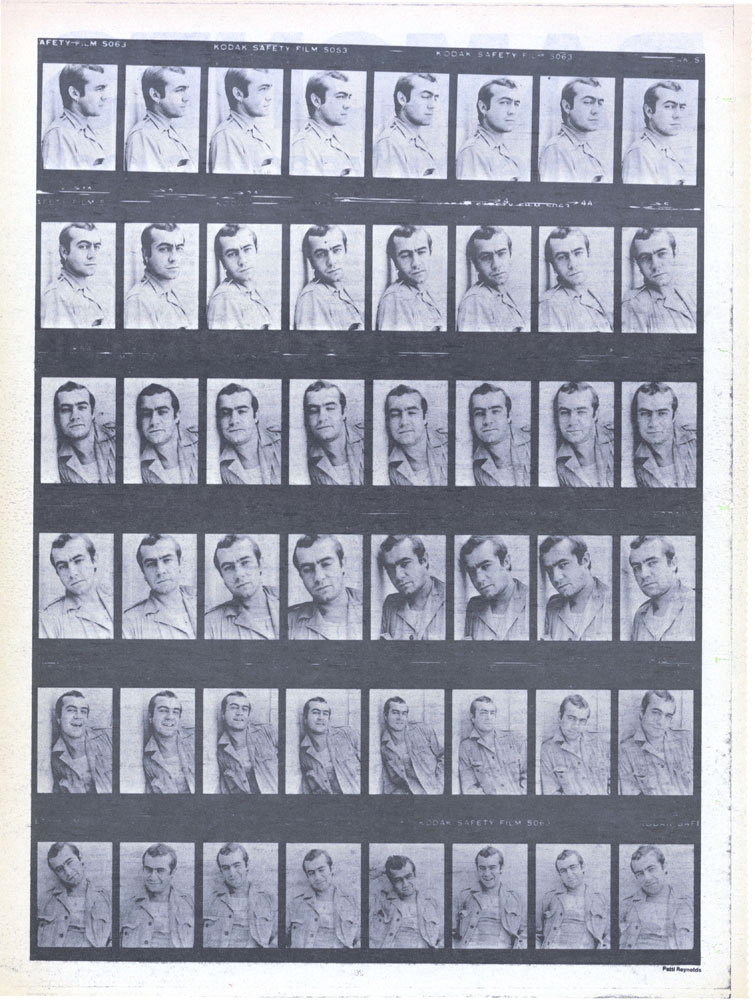
This weekend, illustrious lyricist Bernie Taupin will fuse the worlds of music and art with his solo gallery show “Blueprint—A Retrospective” at Mark Borghi Fine Art in Bridgehampton. The exhibition includes 16 of his contemporary and abstract works that reflect Taupin’s journey and how he has been influenced by art of the ’50s and ’60s. Furthermore, his newst collection “Plain Brown Wrapper” will be on display at Art Southampton art fair in Water Mill, New York.
“Music and art is an inevitable collision,” Taupin tells us. “I personally gravitated from one to the other because I desired to create on a different topical level, and simply because visceral visual art exerts an almost narcotic drive in me.”
Soon after moving to the United States from England in 1970 when he was 20 years old, Taupin became half of a musical duo with Elton John. Together, they created more than 30 albums and produced more than 100 hit songs. Taupin has also worked with musical artists like Alice Cooper and David Ackles, but since the 1990s, he’s pursued his love for visual art, abstract expressionism, and text driven multi-medium pop art. In 2010, he started showing his artwork in galleries throughout the U.S.
“Composition of song took up so little of my time—perhaps all told, a month [or] a year,” he continues.
Taupin’s upcoming showcases inspired us to look back at one of our archival interviews, in which he discusses his love for music and working with Elton John. —Saloni Gajjar
Bernie Taupin: The One Who Puts the Words in Elton’s Mouth
By Victor Bockris and Liz Derringer
“Bernie Taupin is, without a doubt,” his bio read, “one of the most talented and prolific lyricists of the ’70s and an integral part of the Elton John phenomenon. A bookworm since childhood (“reading is my passion”) Bernie didn’t start writing lyrics until he was 17. Now, with over a hundred hits behind him and feeling more prolific than ever, Bernie recalls how he and Elton first met.
“Elton and I both answered an ad in a London music magazine searching for new musical talent. Elton was strong on music and I on lyrics and we moved into a freezing cold flat together and started to write. We were signed by Dick James Publishing Company and encouraged to write commercial ballads. They were awful but we were fortunate enough to have a friend at the company who encouraged us to write what we wanted. Two weeks later we went back with ‘Lady Samantha.’ Elton recorded it, it became a mild hit in England, and little by little we began to make some headway. Then, in 1970, Elton and the band went to the States and what happened at Doug Weston’s Troubadour in Los Angeles on August 25, 1970, is now pop history. From that point on it’s all been a hell of a lot of fun. Hard work, but fun.”
Taupin’s accent is straight from the English midlands, which means it isn’t as thick as northern English but has a friendly rounded tone to it. He is given to laughing at the beginning, middle, and end of sentences. He seems to be a workaholic without being a manic and is currently touring the States promoting his book Bernie Taupin—The One Who Writes the Lyrics for Elton John (Knopf 1976), a handsomely illustrated book, designed and edited by Alan Aldridge.
As an assistant ordered drinks we attempted to corner the ebullient Taupin who was moving about the suite in a sort of quasi-disco rhythm, throwing his hands about. “I haven’t been to The Toilet…that’s a bit much for me, but we went to the Anvil. I go out most every night…I like to see the hookers and the drag queens…there’s a place in Paris…”
“Bernie! Sit down. We’ve got to ask some questions.”
“Oh yes, well…” (he draws up a chair).
VICTOR BOCKRIS: What’s the difference between working with publishing people and rock people?
BERNIE TAUPIN: Basically music people are together and publishing people aren’t together. When I said that I’d do this tour they were just going to put a ticket in my hand and shove me onto the flight. It was unbelievable! But old battling Dick Grant there had a go at them and they accepted our conditions in the end.
BOCKRIS: But in the rock field you’re very much on top, whereas in the publishing field you’re probably not.
TAUPIN: Oh no, I agree with that. I wasn’t trying to pull a moody and say, “I’m not accustomed to this!” I just mean I didn’t find them very together. I don’t think they thought out their campaign very well.
BOCKRIS: It’s really great that there are all these illustrations with the lyrics. How did you get the people to do them?
TAUPIN: The only people I take credit for are people I know in the music business. John Lennon, Ringo Starr, Charlie Watts, Alice Cooper, Joni Mitchell…I just called them up and said, “Would you like to do a drawing?” and they were all great, they really came through.
BOCKRIS: Did Knopf pay for everyone?
TAUPIN: They were paid through my English publisher Jonathan Cape ’cause the book originated there. But my favorite thing in the book actually is the preface (which is written by Elton John and reads in part: “Having been told that my doodles would not be needed—I felt shunned. Desperation set it. How could Taupin put a book together without any mention of my name! It took a few threatening phone calls a few broken limbs before it was agreed to call the book Lyrics I Have Written to Elton John. Eventually though, I was worn down by Taupin’s whimpering and is continuous habit of wearing plaster casts. I decided to let the little fellow have his own way—as long as I would be permitted to write the foreword.”).
BOCKRIS: I read that you wrote the whole Yellowbrick Road album in three days.
TAUPIN: About three or four days. We originally went to Kingston, Jamaica, to record it, but it was so disastrous, the studio was so abysmal—every time you kicked the piano a cockroach would fall out of it and they were totally devoid of any equipment and the natives were getting very restless.
BOCKRIS: Bongo drums outside? Gee, I was going to go there. Is the whole area like this?
TAUPIN: No, because the thing is I go to Barbados all the time.
LIZ DERRINGER: I love Barbados.
TAUPIN: Barbados is fucking great! I’m going, in fact, the last week in June. I love it there. So anyway, we tried to make the studio work, but it just didn’t work so we said, “Screw this, we’ll go.” But we nearly didn’t actually because they had us practically locked in the hotel, were threatening to sort of duff us up. But we got out and went back to France and did it in the Chateau. All the lyrics were written before we went to Jamaica. I wrote the songs up in Lincolnshire where I had a cottage. I just took a week out, went up there and spent the week writing the songs. It was a particularly productive time. I couldn’t stop writing. I was just churning them out and then I gave them to him and he wrote the music in Kingston while he was waiting for the studio to be put together. In fact, the studio had barbed wire fence around it and a guard with a machine gun.
BOCKRIS: What is it about writing that you really like then?
TAUPIN: I think it’s because I can express myself better on paper than I possible can orally. I really enjoy writing. I mean there’s a great feeling if you write something and you’re really pleased with it. That’s the best buzz you can get. If I get ideas now I just jot them down and then I wait until the need for songs is there and I start piecing them together. My favorite thing is coming up with titles. The majority of the songs I’ve every written I’ve always thought of the title before I’ve written the song.
BOCKRIS: Do you actually keep notebooks?
TAUPIN: I have my lyric book which is quite interesting because I go back over it and I see all these songs and I go, “I remember writing that.” And they’ve been number one singles all over the world and sold so many millions and I sort of look back.
DERRINGER: You just hand it over to Elton?
TAUPIN: Yeah, and the thing is its very strange but it usually ends up how I want it to be more or less. But I always feel incredibly naked until the song is completed.
BOCKRIS: Before you were successful, did you go through periods of despair?
TAUPIN: I got frustrated in the period of time prior to meeting Elton. I was getting depressed because I was in a sort of small town community and it was really getting on top of me. I’d tried everything and it was really a big wrench to pull myself out of that community because I knew everybody and I just didn’t know anybody in London, and I said, “Shall I pack my little handkerchief over my shoulder and set off for the big city?” and luckily I did, much to my…
DERRINGER: Luckily for the world.
THIS INTERVIEW ORIGINALLY RAN IN THE JULY 1976 ISSUE OF INTERVIEW.
New Again runs every Wednesday. For more, click here.

